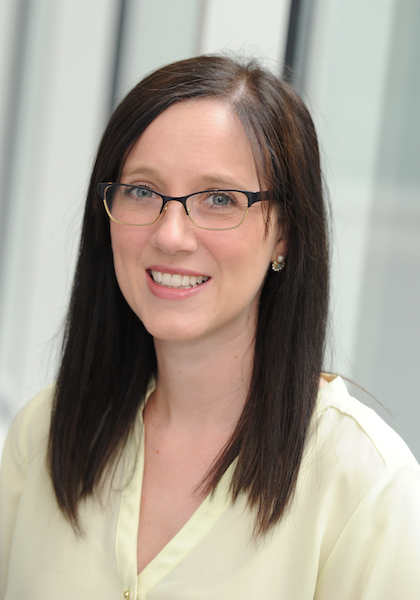Family Matters: Dollars, Decisions, and Dealing with Divorce
Whitney Lallas is a family law attorney in Maine. She shares her journey into family law, influenced by her interest in psychology and math. The emotional and financial aspects of her work figure prominently into what she likes about her work, as well as what's challenging. She provides insights into handling prenuptial agreements, child-related matters, and dealing with hidden assets. Whitney also explains her eat-what-you-kill compensation structure and emphasizes the significance of maintaining work-life balance. Whitney is a 2019 graduate of the University of Maine School of Law.
Transcript
Katya:
We're joined today by Whitney Lallas, a 2019 graduate of the University of Maine School of Law. She practices family law at MillerAsen, a six lawyer law firm in Maine.
Whitney, what drew you to this area of practice?
Whitney Lallas:
I go back to when I was in high school and my AP psych teacher had been to law school, so he liked to teach his classes with the Socratic seminar method. So I kind of was like, “what's that all about?” But I also had this interest in numbers in math and finances. So family law, I thought, was the perfect overlap between psychology, emotional stuff, and financial-related things.
Katya:
In what ways did you develop the skills related to that psychological side?
Whitney Lallas:
In any sort of family law training you get, you're taught how to deal with people going through difficult times. You're taught how to listen, how to validate them, how to very politely push back and get the information you need from a client who is going through a difficult time. A lot of those skills you learn in the field. Now that I'm in the field, I continue to learn those skills every day. And those are sort of enhanced by continuing legal education work that we take as lawyers to keep ourselves licensed.
Katya:
You referenced your love of math. And I think people really underestimate how important understanding math is to those who are practicing law.
Whitney Lallas:
Yeah, I agree. And I heard a lot of times when I was pursuing my law degree that, oh, I'm a lawyer, I don't do math. And it's just not true. I mean, I do math every day. If you look at my apps on my phone and you look at the calculator usage time, it's like hours and hours a day. I'm just crunching numbers all of the time. So you kind of have to like it. You have to know a little bit of what you're doing mathematically.
Katya:
So I want to talk a little bit about an unexpected thing that happened at the start of your career. When you were early on in your career, you faced the uncomfortable situation of your firm dissolving. What was going through your mind leading up to that dissolution?
Whitney Lallas:
Right, yep, that did happen. And it was in the middle of the pandemic as well. And so, we were dealing with the pandemic and lawyer life amidst the pandemic. And so, even if our firm was not dissolving, there was still this big question of, am I gonna have a job as a lawyer? What is the economy gonna look like? So once I heard the news that the firm was dissolving, there was a little bit of panic that I felt, but thankfully I have a very wonderful, strong mentor who sat me down and said, “Don't worry, we're dissolving. It's okay. You know, you're going to come along with me.” And that's what happened. And a lot of the same staff came over with us too.
Katya:
Does that mean then, at a high level, you're still doing the same type of work you were doing at your previous firm?
Whitney Lallas:
I would say so. I think the work feels the same. I'm still doing family law. I'm still working with clients, still in the courtroom. When I say family law, I mean divorces. I mean post-divorce work, someone who has been divorced and they wanna make a change to their divorce judgment, whether it be the parenting plan, the custody schedule, child support, anything that just needs an update. I also do some prenups and, for folks who are not married but have children together, I do parental rights and responsibilities work.
Katya:
How long did it take you to get comfortable with this sort of work?
Whitney Lallas:
That's a good question. I think the first two years coming out of law school are really a tough time. It's a grind, it's a real grind. You're learning a lot, just enough to be dangerous, just enough to take on your own cases. But I would say years three and four are where things start to get comfortable. You know what you're doing a lot more than you did before. And that's why they call it the practice of law. I mean, with each year, you just get better and better and you know more and more and you learn from your mistakes.
Katya:
So what were some of the things you did in your first two years to build that confidence?
Whitney Lallas:
I did a lot of trainings. So there was a trial practice course. It was multi-day trial skill intensive where they're giving you a set of hypothetical facts and they're saying, here's your hypothetical expert. How would you cross examine them? How would you direct them? Like a moot court type situation. My first year in practice and I did a lot of shadowing, going into the courtroom to watch how other lawyers do things. It's really helpful. I was second chair on a few cases with my mentor, Diane Duccini, and learned a lot.
Katya:
So you mentioned making mistakes when you start out. How do you overcome that? Once you realize you maybe made a mistake somewhere along the way?
Whitney Lallas:
I think you overcome that by realizing it happens to everybody. You try hard not to make mistakes, but it happens. Nobody is perfect. When you make a mistake, it's just a matter of saying to yourself, “How did this happen? What can I do to change my process? And what can I do to correct it in the future?” And I think... you know, taking ownership. If there's another lawyer involved, like a supervising attorney, I think taking ownership and talking to that person is really important. And most times your supervising attorney, when you're a new lawyer, they wanna help. I mean, they are there to help you. Most times they're gonna support you take your side and not necessarily have a harsh reaction, but more of an inquisitive reaction and figure out how do we move you forward and learn from this.
Katya:
I want to turn now to what you do when a new client walks in the door, what typically is your first step?
Whitney Lallas:
What we don't want to have happen is have one of us here, one of the lawyers here, commit to representing the wife in one of our cases when someone here has already spoken with or consulted with the husband. And you can imagine that would be a nightmare, right? Because you have two parties who are adverse to one another that are represented by lawyers at the same firm. That is a situation that you have to avoid. If you don't avoid it, there are consequences. It's a violation of your ethical duty. So getting that conflict check done is first and foremost. You cannot give any advice until that's clear.
If anybody has watched the show Succession. Shiv and Tom are getting a divorce and Tom goes in, calls every lawyer around and conflicts them out. So it was a strategic move and he was trying to make it so she didn't have legal counsel. So that's an interesting part of that show and sometimes that happens. It happens on a smaller scale here in Portland, but this is just an example of how a conflict check works.
Once that conflict check clears, you set up an appointment, they come in. During the initial consult with the client, there's a lot of ground that gets covered. Typically, we just start with the very basic information in terms of getting some context of who they are, where they work, who are their kids, and what they're looking to gain out of the court process. Because people are looking for a lawyer for different reasons. So trying to figure out what their goals are, I think, is really important for me to know so I can figure out, are we going to be a good fit? Or are your expectations too high and not reachable? So sometimes it's an expectation setting type of conversation, which is good to have early on. We also talk about fees in the initial consult. Really important to be upfront about that type of stuff. I explain right away, we have an engagement letter that you'll have to sign. You know, I bill, here's my hourly rate. I bill up against a retainer. We expect that you'll pay the retainer early on, and we won't do any work until that retainer's received. It's really important to do that.
Katya:
Whitney, let's say a client walks in and they are looking for you to help them with a prenuptial agreement. How do you handle or how do you counsel a couple that may not see eye to eye on whether a prenup agreement is even necessary?
Whitney Lallas:
I've been on both sides of that. And I think when you're working with the person who does not want the prenup, we have to have a lot of really tough conversations. And, say, look. that you're going to marry this person, you should be able to have these types of difficult financial related conversations with them. And if you two can't reach mutual ground on something, then I'll take it from there. I'll call up the other lawyer because in Maine, each party is required to have a lawyer to get a prenup done. Or at least to strengthen the enforceability of it. So then, you know, I can call up the other lawyer and negotiate terms and try to move money around and make it so it's a bit more fair. Otherwise, the pre-nup, it's not going to get done. And if there's no pre-nup, then you're just left with regular old Maine state divorce law, which offers some protections, but not as much as some may hope.
Katya:
If each party to a prenup has representation, what is the process like for getting the agreement drafted?
Whitney Lallas:
Sometimes I look to what I've done in other prenups. I will look to see, is this a similar situation? Do I need to tweak anything? Do I need to make a provision a little bit more particular? Does this case need more spousal support or alimony, as other states call it? Are there more pieces of real property? Do I have to add in more provisions there? So it's really fact specific. You're drawing from the information that you have learned from the client in the consult to then adjust the template. Once the drafting is complete and you feel as though it has embodied what your client's looking for, you would then send it over to your client and say, hey, take a look, let's review this together, make sure it meets your understanding of what this prenup is going to accomplish. And then once that happens and you get your client's approval, you send it over to the other lawyer. And then there's some back and forth, some negotiations from there.
Katya:
You said that you are referring to the facts that you have about real property, about finances. Do you collect documentation and records to reference or are you just going off the word of your client?
Whitney Lallas:
I like to collect documents as you can't always trust the word of your own client. It's common for me to say give me two years, tax returns, your W-2s, a bank statement, most recent retirement account statement. If their house has been appraised, give me a copy of the appraisal. Otherwise, we'll just do a quick look on Zillow, which isn't always accurate, but something to go off from. And sometimes a resume is helpful to see what their job history has looked like and what their income and earning potential looks like. Documents are very helpful and very important for me to have so I know that I'm accurately representing the situation to the other lawyer.
Katya:
Let’s say a couple that you've worked with or a client that you work with does end up getting a divorce. How much does having the prenuptial agreement impact the work that you do for the divorce?
Whitney Lallas:
It's quite impactful. Prenups are designed to make the divorce process streamlined and efficient. So long as you're working with an enforceable prenup, which, you know, you're not always working with an enforceable prenup, but so long as it's enforceable, the property distribution should be pretty straightforward and easy. The thing that complicates matters is if the couple has now had kids. Because a prenup can't fully address child-related issues. So at that point, you're dealing with, what is an appropriate contact schedule? What does child support look like? Are we in agreement? Are we not? Are we gonna need a hearing?
Katya:
If you were to work with a client who did not have a prenup before the divorce, it would be at that point that you would collect that financial information, the tax documentation, the resume documentation. So you would start that information gathering at that point instead of hashing it out ahead of time.
Whitney Lallas:
A lot of the times when folks do not have a prenup and they're trying to get divorced, they will have non-marital property, which in the state of Maine, non-marital property is outside the court's jurisdiction. It's supposed to be set aside to that owner who owns the non-marital property and cannot be divided as if it were marital property. We run into issues sometimes where we're trying to ascertain the value of non-marital property. How much was in your 401k at the time of the marriage and what has that grown to today?
That can be a difficult question to answer and can require assistance of experts if your information is limited. In some of these financial institutions, they don't hold on to retirement account statements for as long as the length of the marriage. So it's a little bit of guesswork, which can make things complicated.
Katya:
And then whether there is a prenup or not, if a couple has children, then there's some additional work I would imagine you do as you're working through the divorce proceedings. So what sort of work do you do as you're trying to establish the terms for a couple's children?
Whitney Lallas:
Oh, we have to figure out a parenting plan. So a parenting plan consists of where's the child gonna reside? What is the contact schedule? Rights of contact? What is that gonna look like? What is child support gonna look like? And what is the decision-making process gonna look like? For example, where are they going to go to school? What sorts of medical treatment does the child require? All of those things need to be determined. And sometimes it's not a straightforward answer. A lot of it depends upon where the parties are gonna be living. Are they gonna be living close by, close to one another? If so, maybe a shared residency schedule makes sense where both parents are having frequent and meaningful contact with the kids. But if you have a situation where parents need to live far away from one another, maybe one parent has family in another state and they want to go there, then that's going to make the contact schedule difficult if both parents are looking to have frequent and meaningful contact with the kids. There's a lot of discussions about what's in the child's best interest, which is our legal standard. Everybody has different perceptions. Everybody has different thoughts on how children should be brought up. So that is the crux of where a lot of arguments during negotiations happen.
Katya:
What do you look to help you determine or to make an argument for what is in the child's best interest?
Whitney Lallas:
It varies. I think if I can call up the child's therapist, if the child is in therapy, and hear from the therapist how things are going. Is the child conveying any concerns about one parent or another? That can be helpful. And sometimes therapists keep notes, sometimes they don't. Medical records, sometimes there are allegations of abuse. And if that is on the table, more often than not, the doctor will be apprised of that and be aware of that and it'll be in the medical documentation so that can be helpful to have.
Katya:
Are financial records a part of the consideration?
Whitney Lallas:
Not so much in determining what's in the child's best interest. The financial records come into play with child support. if we're trying to determine child support, we're looking to the party's incomes. For documents, I'm looking for tax returns, W-2s, pay stubs. I mean, those are usually the best indicators of income. But if you have someone who is self-employed, owns their own business or is a partner somewhere, then you're looking for profit and loss statements, you're looking for their Schedule C on their taxes, accounts receivable, things like that.
Katya:
Have you ever dealt with a situation where you thought the other side might be trying to hide assets?
Whitney Lallas:
All the time. When the trust has been broken down, there's a lot of suspicion into what does he have going on. “What does he have for assets? You must be hiding something. I'm entitled to a little bit more. Of course he's not disclosing that because he's just gonna keep it for himself once this divorce is over with. I see a little bit of that.” So it's unfortunate, but it does happen.
Katya:
How much of your practice is in the courtroom versus talking with your client or opposing counsel?
Whitney Lallas:
I'd say most of my practice is outside of the courtroom. In a family case especially, you want to settle outside of the courtroom because judges don't know the intimate details of your lives. I spend a lot of time talking with my clients about what's a good outcome for you. What makes sense? What's worth compromising on? Are any of these things that are proposed to us from the other side. Are they deal breakers? Can you live with a pick up and drop off time that's 6.30 p.m. as opposed to 5.00 p.m?
Katya:
So you just said that you are interested in a good outcome for your client, and rightfully so. But you must also be interested in a good outcome for you. You enjoy the financial aspects of practice, so I want to talk a little bit about how you get paid. You're a fairly junior associate now. You're just four years into your career. How do you make sure that you are getting paid for the hard work that you do?
Whitney Lallas:
I'm paid on a eat-what-you-kill type of compensation structure. So that means that the money that goes into my pocket as compensation is directly correlated to the dollars that I collect from my clients. So I'm paid a certain percentage of the dollars collected up to a certain threshold. And then once I meet that threshold, my percentage increases. So there's incentive to bill, there's incentive to collect. The more you're collecting, the more you're taking home. And this is not the case for everyone. A lot of my colleagues and friends from law school, they're on a fixed salary structure. That's not how I do it. And it's not my preferred route either. I like being incentivized to collect.
Katya:
So does this mean that you don't have guaranteed income every two weeks or every month?
Whitney Lallas:
That is exactly what it means. My income varies from paycheck to paycheck. It ebbs and flows and you get used to it. I'm now in my second year of doing it this way. And it's a bit of a roller coaster at first, but it's certainly something you can adapt to.
Katya:
That has to be difficult, but it sounds like you're inspired by that incentive, so I would imagine that finding clients then as an important part of what you do.
Whitney Lallas:
I think I'm lucky to be at a firm where we do get a lot of intake calls. That's part of it. There's no shortage of clients. I also don't know what's going on with the world, but it seems like everybody's having a family matter issue and you hear in the outside world that people are having a hard time finding family law attorneys.
Katya:
You said that your compensation is based on collection, which is an important distinction from basing your pay based on how much you charge clients. Can you talk a bit more about that distinction?
Whitney Lallas:
So when I say “collected dollars” I mean the actual money that the client is paying for me to do the service. I can charge a client $1,000 an hour if I want, but if I'm not receiving the money from the client, then that's not a collected dollar and then that's not something I'm going to see as part of my compensation. I think what's important to me, given how I'm paid, is making sure that I'm working with clients who are able to pay and who can pay the retainer and who can reliably re-up the retainer if we get near depletion.
The retainer helps guarantee that the dollars are going to be collected because when the bill goes out at the end of the month, we already have the client's payment in our trust account. And so what that means is the bill will go out, the hours that I've billed will then be collected from the dollars that are in the trust account immediately.
Katya:
So a retainer basically then protects you from not getting paid because you're drawing against that money you got upfront. Otherwise, the risk would be on you.
Whitney Lallas:
Exactly. The risk would be on me. Otherwise, we would be sending out a bill that says, here's your monthly bill for services. Please pay us within 30 days. It's risky.
Katya:
So what do you do when the retainer runs out?
Whitney Lallas:
We try to not let it run out. We all keep a very close eye on the retainer funds. And if it's nearing depletion and there's still a lot of work that needs to be done in the case, it's rather important to have an open line of communication with your client to say, “hey, look, your retainer funds are nearing depletion. Could you send in another check and re-up?” The expectation is set early on for that because it's in our engagement letter. We talk about it in the initial consult. They know.
Katya:
Would there be any circumstance in which you would do work for a client once their retainer was depleted?
Whitney Lallas:
Oh yeah, it happens.
Katya:
Haha.
Whitney Lallas:
It happens. I think that... It happens when maybe the case is hot and heavy and it's happening fast, it's going 100 miles an hour and you know this is a reliable client, they're going to pay. And maybe right at the moment, re-upping the retainer is not the most pressing thing. It definitely happens. Happens to everyone. There are also circumstances where, if I've worked with the client in the past and I know they're good for it, then we'll continue doing work and we'll address the retainer later on. But that's definitely, not a common circumstance.
Katya:
Family law can be really emotional and draining for clients and also for their lawyers. What do you do to maintain sanity and joy in the workplace?
Whitney Lallas:
I try my absolute hardest to not work from home, which is interesting given the pandemic, right? We've seen this whole trend where lots of people are working from home and it's their preference. It's absolutely not my preference. I try to keep a very good boundary where I leave the office at, you know, five, five thirty or six and I'm done with work for the day. By doing that, it sets clear boundaries, clear expectations with the client that I'm not gonna be responding to you eight o'clock, nine o'clock at night. I will get back to you the next day at nine o'clock in the morning. So you just wanna set a clear precedent that way, otherwise clients are gonna be expecting you to respond immediately. When you're just trying to enjoy your life and have a peaceful dinner with your loved ones.
Katya:
Were you able to set this boundary early on in your career or did you need to build some confidence first?
Whitney Lallas:
That took some practice. I think, as a very, very new associate, I really wanted to work. I wanted to work hard, I wanted to do a good job, I wanted to learn a lot. I was at the office earlier than I am now these days and I stayed later. And I definitely was looking at my emails at eight o'clock, nine o'clock at night. And I think that's common for really, really new, fresh out of law school folks. But I think I had a lot of people surrounding me who said work-life balance is really important. You need to have a life. Your job is not your life. It's an important part of your life, but you need a break. Otherwise, you're not gonna be able to sustain this forever. So you wanna be able to take care of yourself so you can take care of others. And I live by that strongly.

 Katya Valasek
Katya Valasek






